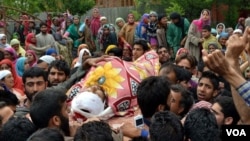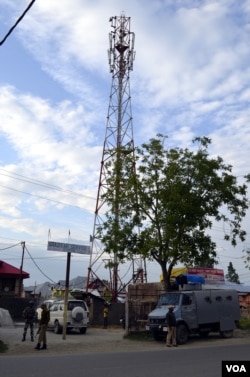In Indian-controlled Kashmir this week, former militant Aijaz Ahmed Reshi was undergoing some medical tests in a town outside Srinagar when two unidentified gunmen shot him to death. The assailants escaped.
Reshi, 36, a father of four, was a former militant who had spent a three-year-term in jail before being released in 2010.
“He shunned militancy years ago and was leading a peaceful normal family life with wife and children. To support his family he was working hard as a day wage laborer and had no connection with any party or movement. We cannot figure out who could have been his enemy,” Reshi’s uncle Mushtaque Ahmed told VOA.
Since late May, Reshi is the sixth victim in a series of unsolved targeted killings in and around the northern town Sopore. The first killing, Rafiq Akbar, an employee of a mobile franchisee, was shot dead in his office in Sopore on May 25. Following his death, workers in mobile-phone related services began receiving threats that they would meet the same fate if they did not shut down their businesses.
A 60-year-old man who had leased out his land to build a mobile phone tower to a telecom company was killed in Sopore in the same style on May 26. Another landlord who rented out space for a mobile tower survived a similar attack by unknown gunmen.
Then, four men, including Reshi, were killed in separate attacks in the same area of Kashmir between June 9 and 15. One of them, like Reshi, was a former militant. Two others were an activist and a supporter of a Kashmiri separatist party known as Tehreek-e-Hurriyat (TeH).
Killings trigger fear, panic
None of the gunmen have been caught, which locals say has triggered fear across the town - especially among those who are identified as anti-India activists and those involved in mobile phone-related businesses.
Located 50 kilometers from Srinagar, Sopore these days is largely desolate after sunset with very people few venturing out of their homes. Many shops in parts of the town are staying closed for days at a time.
Altaf Ahmad, a businessman who hails from Sopore and works in Srinagar, said that his 36-year-old cousin is among many men with records of defiance against local security forces who have left home recently out of fears they could be targeted.
“Some years ago my cousin took part in demonstrations against security forces and some cases of stone pelting were registered against him. After one man with identical police cases against him was shot dead last Saturday, my cousin began panicking and fled Sopore immediately,” Ahmad said.
Residents of Sopore say that the latest series of killings started soon after posters signed off by a previously unknown outfit called “Lashkar-e-Islam” (LeI) - meaning “army of Islam” - threatening tough actions against phone companies and others in mobile-related services, surfaced in the area.
The posters allege links between the mobile services and the arrests and killings of members of their group. Mobile phone operators report they have shut down more than 1,000 mobile towers in Baramulla district where Sopore is located.
Although LeI claimed to have killed the first two men who were in the telecom businesses, none claimed responsibility for the last four killings.
Unusual shootings shake region
Fayaz Ahmad, a leader of local fruit merchant association in Sopore, says the killings are unlike any that came before.
“We have seen killings in Kashmir since 1990s. Whenever militant groups killed people, they instantly owned up the killings. In the latest cases no known militant group has claimed responsibility at all,”Ahmad said to VOA.
The circumstances have led many locals to question if there is indeed a new militant group or whether the killings are some sort of retribution by Indian security forces.
Kashmiri separatist leader Syed Ali Shah Geelani, who is the founder of TeH, said no militant groups would target individuals who themselves had opposed Indian security forces in Kashmir in the past.
“Why will any faction of rebel group or militants attack ordinary Kashmiri civilians who are leading normal peaceful life?” Geelani, 86, said to VOA.
Last month, India's defense minister told reporters that security forces in Kashmir would try to exploit differences among the region's militant groups to weaken and undermine them. In remarks quoted in Indian media, Manohar Parrikar said terrorists could be a tool to fight terrorism.
Police blame separatists
Indian authorities say allegations that they are in any way involved in the deaths are baseless.
Speaking with VOA, Garib Dass, deputy inspector general of north Kashmir range where Sopore is located, blamed the killings on a splinter group of militants.
“All of these recent killings in Sopore are inter-related and one splinter group of Hizbul Mujahideen, which is called Lashkar-e-Islam, is behind this reign of terror here. Since we have identified the culprits and our forces have swung into action taking the incidents of killings very seriously, we hope we shall be able to catch them soon,” said Dass.
Dass said that militant groups across Kashmir are in disarray with factions opposing each other. He said the attacks on civilians are evidence of frustration as militants choose easier targets like civilians, with innocent people in Sopore paying the price.
In Sopore this week, police put up posters of two originally Hizbul Mujahideen militants, identifying them as the masterminds behind the latest killings. A bounty of nearly $16,000 (one million rupees) has been announced for information leading to the capture of each of the two militants - Abdul Qayoom Najar and Imtiyaz Ahmad Kundoo.





